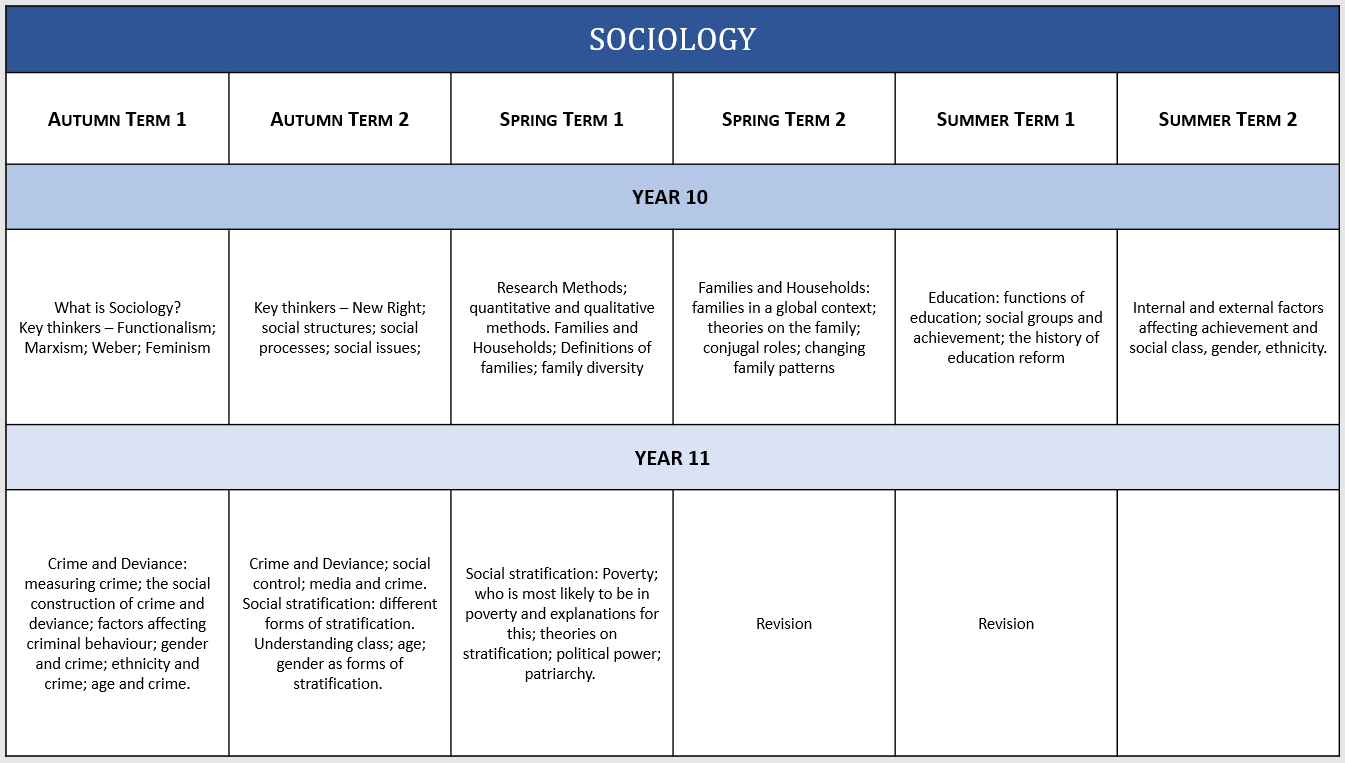Sociology
The Sociology Department
Sociology is a subject rooted in active learning and investigation.
Our sociology curriculum is designed to provide students with a knowledge of the many theories and areas of research that seek to understand the nature of British and other societies. The curriculum is designed to appeal to students at Bishop Douglass School by covering areas that students find fascinating and engaging; we have chosen family, education, crime and media at GCSE and A Level so that students can study topics they find interesting and which relate to their lives. Students will be expected to understand theories of society like functionalism and neoliberalism, critically analyse sociological research and evaluate quantitative and qualitative data. By doing so, they can complete their sociology education with a reliable knowledge of their topics and the ability to apply it independently to historical-type problems.
Running through the sociology curriculum is an emphasis on literacy and numeracy. Essay writing, extensive reading and comprehension are central to the sociology curriculum and are incorporated into our schemes of work. A sociology reading list is also available to students to support their literacy development access to academic texts. Opportunities for numeracy are built into lessons or incorporated into marking and day-to-day teaching.
Sociology is a popular subject and has continued to attract a high uptake at both GCSE and A- Level and has been extremely successful in ensuring its students are successful with their results at both key stages. Furthermore, Teaching & Learning across the department is consistently at the highest level and through constant scrutiny and by observing teaching within the school, we maintain this, in order to ensure that students have the best experience of learning in the subject. A number of our students at A-level choose to continue their study of Sociology in higher education.
Sociology through the Key Stages
As students move through Key Stage 4 they study different aspects of the course including the family, education system and social stratification. At each stage students consider different approaches to the function of these social institutions and whose interests they serve in society. These topics have been purposefully chosen to broaden a students’ experience and to help them prepare for life as citizens. They include the media, crime and deviance, education, social stratification and research methods. Teachers make links to the course content and current affairs like terrorism, knife crime, the gender pay gap and the media. This places the learning in a context that students understand and supports students in understanding new concepts like functionalism and neoliberalism.
Key Stage 4
GCSE Sociology – AQA Syllabus
Sociology would suit students who are interested in understanding the relationship of the individual and society and whether or not our behaviours are determined by social structures or whether we have free will to behave as we please.
The curriculum in Year 10 includes topics such as: Studying Society, Education and Families and Households. Students are encouraged to undertake and formally write up their own research process and findings as an interim assessment at the end of year 10, to develop their understanding of how sociology works. The curriculum in Years 10 and 11 includes topics such as: Crime and Deviance, Mass Media, Power and Social Inequality, all of which are assessed through examination.
Key Stage 5 - Year 12: AS Sociology
The aims of the AS Sociology Course are for students to: Acquire knowledge and a critical understanding of contemporary social processes and structures. Appreciate the significance of theoretical and conceptual issues in sociological debate. Understand sociological methodology and a range of research methods. Reflect on their own experience of the social world in which they live. Develop skills which enhance their ability to participate more effectively in adult life.
Course Content includes: Sociology students cover Family, Education and Methodology. Students study areas like family and industrialisation; family diversity; marriage and divorce; childhood; power and control. In Education, students study topics like the role of education; changing education systems; class, ethnicity and educational achievement; gender and education and pupil subculture. Students will explore and evaluate within this unit, the many methods sociologists use to find out about the real world. Throughout the course students deepen their knowledge base; develop interpretive, analytical, evaluative and application skills.
Students are assessed through two examinations both worth 50% of the course.
Key Stage 5 - Year 13: A-level
Having completed the AS Sociology Course, students will now be able to demonstrate: A deeper understanding of the connections between the nature of sociological thought, methods of sociological enquiry and substantive sociological topics.
A-level Sociology students will cover Sociology of Beliefs; Crime and Deviance, Theory and Method and are also assessed on content from Yr12 (Family, Education and Methods). In the Sociology of Religion, students study the influence of Religion on society; New Religious Movements, gender, feminism and religion; Religion and ethnicity and secularisation. Within the study of Crime and Deviance, students examine topics like suicide; control theories; policing, punishment and control; strain and sub-cultural theory; critical criminology and labelling theory. Students will continue to develop synoptic links throughout Crime and Deviance. Students are assessed through three separate examination papers, each worth 33% of the A-level.
Both AS and A-level Sociology courses follow the AQA syllabus.
Curriculum Plan

Enrichment Opportunities
Students are encouraged to attend a number of open lectures, in their free time, alongside their study of sociology. The Sociology department also arranges visits to important seminars, such as the annual Youth Crime Conference, to maximise both their learning experience and GCSE/ A level grade. Parallel to the course runs the Model United Nations as an extra-curricular opportunity for students to develop their formal debate skills.
For further information please contact us via email - schooladmin@bishopdouglass.barnet.sch.uk





